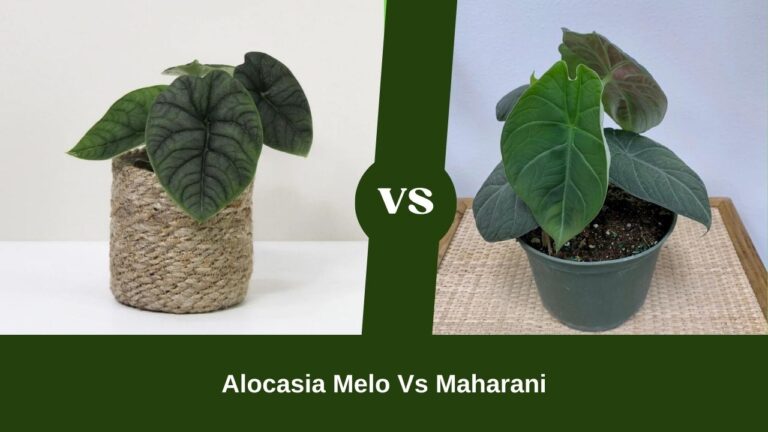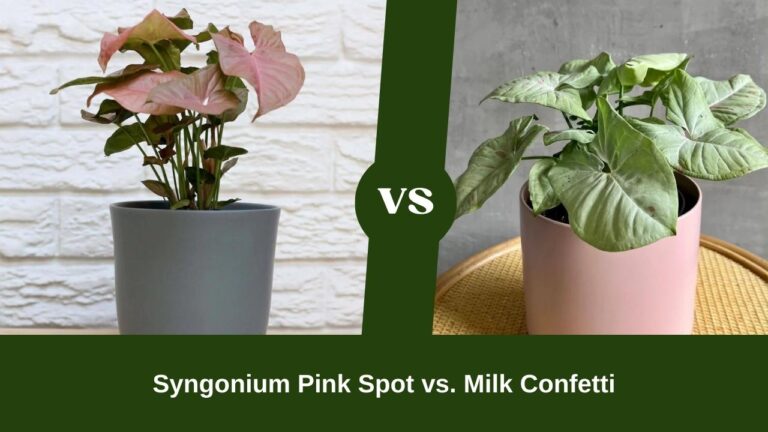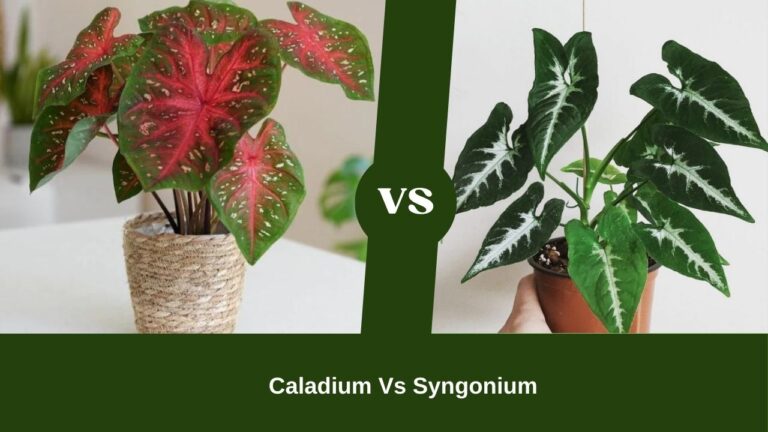Calathea Musaica Vs Network: Differences And Similarities
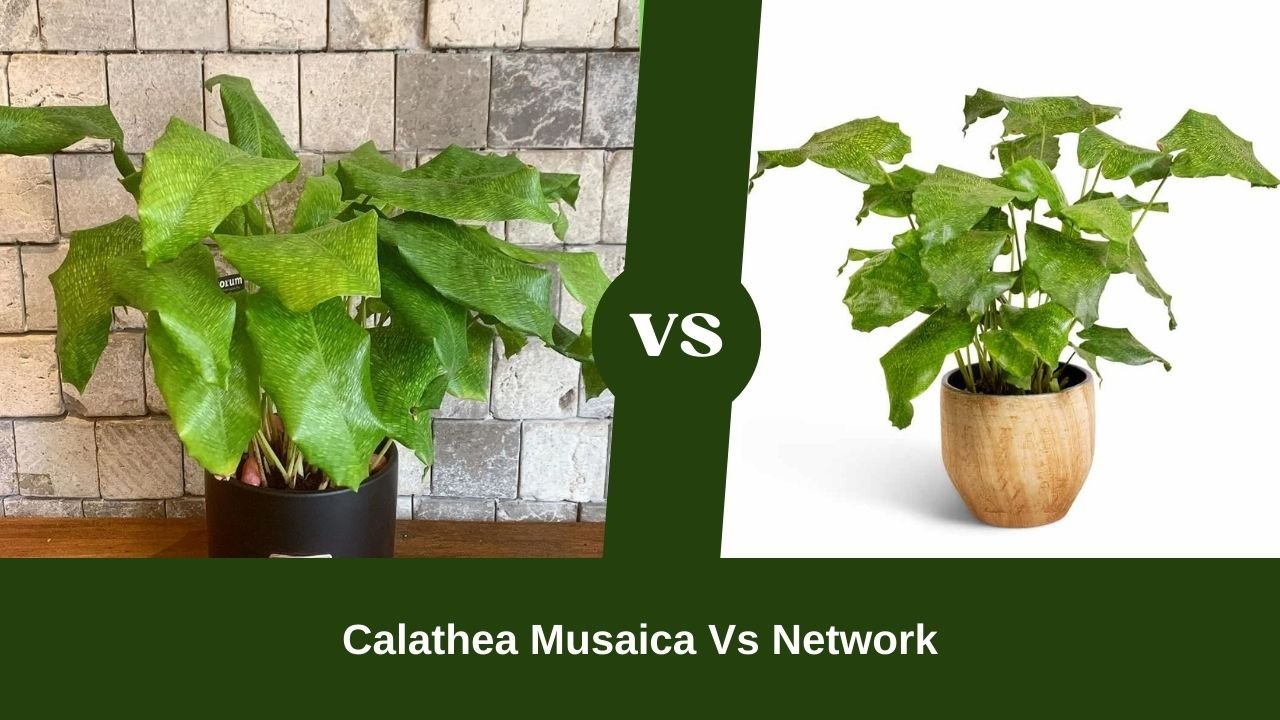
Calathea Musaica has mosaic-like patterns on its leaves, resembling a network. Calathea Network, on the other hand, features a more pronounced network pattern on its foliage. You can say this is the main difference between these two plants.
There are some more differences between these two that I want to discuss in this discussion. I will try to give you a vivid description of both the plants. So, without any delay, let’s start the discussion.
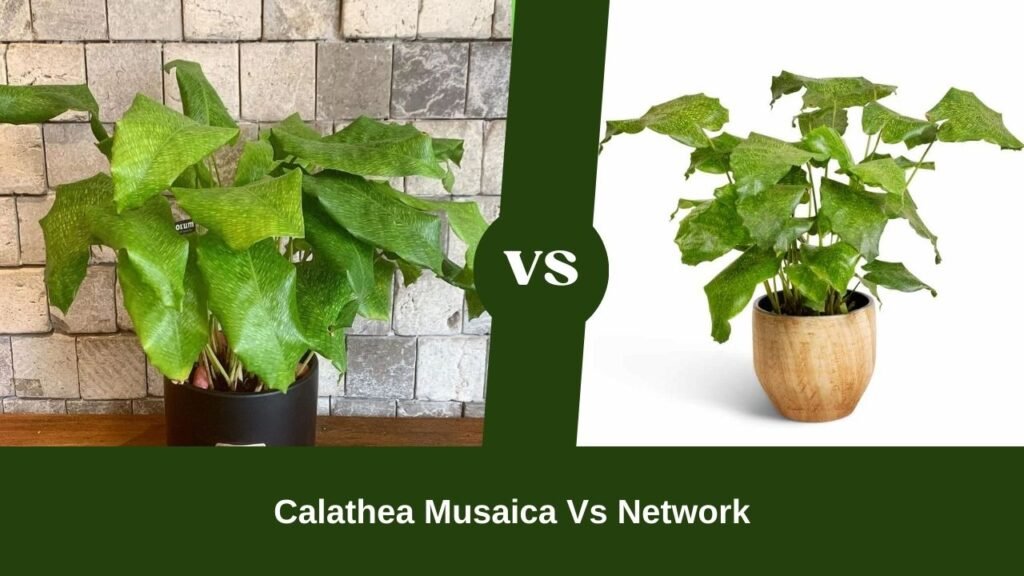
Calathea Musaica Vs Network: Generic Differences
There is some basic info about both plants that will not directly affect your knowing these plants but they will have a great contribution in the later part of the discussion. Here you can see some basic differences between Musaica and Network variations of Calathea.
| Criteria | Calathea Musaica | Network |
|---|---|---|
| Common Name | Calathea Network | Network Calathea |
| Scientific Name | Goeppertia kegeljanii | Goeppertia kegeljanii |
| Family | Marantaceae | Marantaceae |
| Type | Perennial, Rhizome | Evergreen |
| Price | Amazon | Amazon |
| Lifetime | up to 5 years | 5 years. |
| Toxicities | not poisonous to pets | It is non-toxic |
Calathea Musaica VS Network: Appearance
Appearances say everything about an indoor plant. Both Calathea Musaica and Network are almost the same but there are some minor changes in the appearance of both plants. Let’s see the detailed appearance differences between both.
| Criteria | Calathea Musaica | Network |
| Size | Up to 2 feet tall | Can grow to between 1 and 2 feet tall |
| Leaves | Glossy green leaves with a mosaic-like pattern of fine yellow and green lines | Boldly veined leaves that create a striking variegation pattern |
| Flower | White | Tiny white |
| Root | Rhizome structure | Rhizome structure |
| Stems and Bark | Long Burgundy Steams | Long Burgundy Steams |
| Growth Habit | Slow growing plant | Medium growth rate |
Leaf Patterns
As both are leafy plants, their main beauty belongs to their leaf beauty. Both are amazingly beautiful in consideration of their leaf. Calathea Musaica has glossy green leaves with a mosaic-like pattern of fine yellow and green lines.
On the other hand, Calathea Network has boldly veined leaves that create a striking variegation pattern, giving it a distinct appearance.
Read About Caladium Vs Calathea
Size Differences
The size of both Network and Musaica is almost the same. But Calathea Musaica tends to be slightly taller. Calathea Network can grow around 1-2 feet and Network can reach up to 2 feet.
Flower Characteristics
Both plants have less value of flower because both are leafy plants. But you must know about their flowers also. Calathea Musaica has a small white flower.
Calathea Network flower is almost the same as Musaica. I find no differences between them. Look at the image I added here of both flowers.
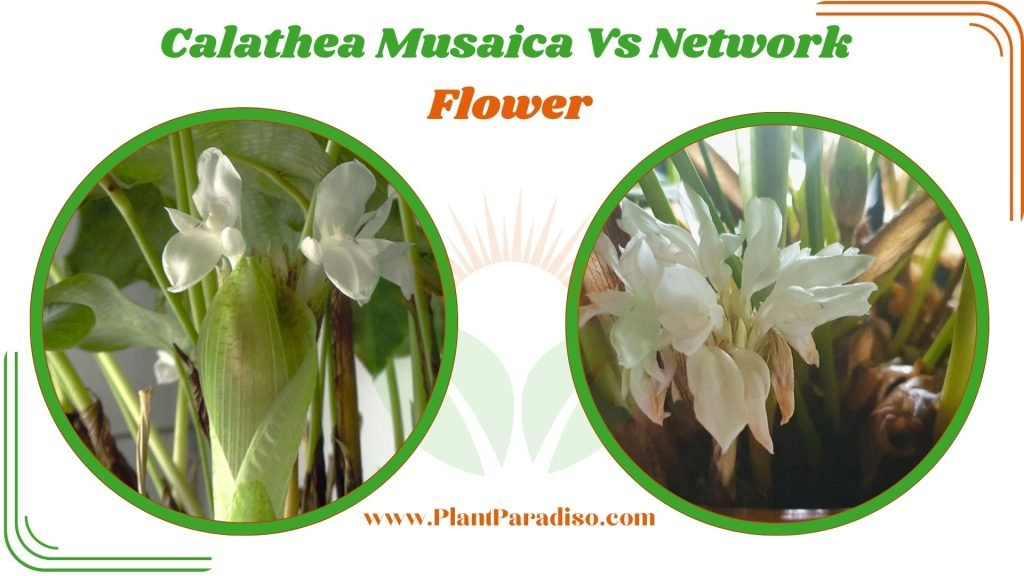
Growth Rate
The height should say all about the growth rate of both plants. But, let me clear both again. Calathea Musaica grows slowly. In contrast, the Calathea Network has a medium growth rate, making it relatively quicker to reach its mature size compared to the Musaica variety.
Read More About Alocasia vs Colocasia
Calathea Musaica vs Network: Care
After telling you all about the appearance differences, let’s see how the care process of both have some different aspects. After the table, I will add a detailed discussion here.
| Criteria | Calathea Musaica | Network |
| Light Requirements | Bright, indirect light is good but can tolerate higher light. | Bright indirect sunlight |
| Watering needs | Water thoroughly once the top inch of soil feels dry. | Needs watering as often as the top 1” (2.5 cm) of soil dries out. |
| Soil type and PH | Water thoroughly once the top inch of the soil feels dry. | a well-draining fertile potting mix. |
| Temperature and Humidity | 65°F (18ºC) to 85°F (30°C). Will stop growing below 60°F (15°C).>50%, but 60-80% is ideal. | 65 and 80°F (18 – 27°C). |
| Fertilization | Fertilize with a balanced preparation every 4-6 weeks during Spring and Summer | can benefit from applying diluted house plant fertilizer two or three times a year. |
| Propagation Methods | propagate by division of the rhizome | propagation by root division |
Light Requirements
Calathea Musaica is a low-light plant, it prefers bright but indirect light. This does not mean it can’t tolerate direct light, Slightly higher light conditions are also okay for Musaica. But Avoid direct sunlight for a long time, as it can scorch the leaves.
Calathea Network is also the same, It requires bright indirect sunlight. It’s sensitive to the direct sun. You should always keep the Network away from the harsh rays of the sun to prevent leaf damage.
Watering Needs
This is a vital part of plant care. Calathea Musaica needs to water thoroughly when the top inch of soil feels dry. Calathea Network needs watering if the top 1 inch (2.5 cm) of soil dries out.
Maintaining adequate humidity around the plant is crucial for preventing the soil from drying too quickly. But remember, don’t overwater your plant, this is always dangerous.
Soil Type and pH
Calathea Musaica thrives in well-draining but moisture-retentive soil. If you mix 2/3 peat or coco-coir and 1/3 perlite, it will be an ideal balance.
Calathea Network, on the other hand, needs a well-draining fertile potting mix.
Temperature and Humidity
Calathea Musaica likes lower temperatures. Best suited to temperatures between 65°F (18°C) to 85°F (30°C). Growth may halt below 60°F (15°C). Prefers humidity above 50%, with the ideal range between 60-80%.
Calathea Network thrives within a temperature range of 65 to 80°F (18 – 27°C). It also prefers higher humidity levels, similar to Calathea Musaica.
Fertilization
Calathea Musaica benefits from regular fertilization with a balanced preparation every 4-6 weeks during the active growth period in Spring and Summer.
Calathea Network can benefit from diluted houseplant fertilizer application two or three times a year, so it generally requires less frequent fertilization compared to Calathea Musaica.
Which Plant Will Be Good For You?
Selecting the right plant depends on your lifestyle and living conditions. If you have ample sunlight, low maintenance needs, and minimal space, a resilient succulent like a snake plant or aloe vera may suit you.
For those seeking lush foliage and a bit more care, the Calathea Musaica or Network can add vibrancy to your space. If you’re keen on fresh herbs or vegetables and have a sunny spot, basil, mint, or cherry tomatoes in containers might be ideal.
Consider allergies and pet safety when choosing. Ultimately, the perfect plant is one that aligns with your preferences, lifestyle, and the environment you can provide.
Conclusion
In this Discussion, we explored the differences between two captivating houseplants, Calathea Musaica, and Calathea Network, regarding their appearance and care requirements. We highlighted distinctions in leaf patterns, size, flowering, and growth rates.
Moreover, we delved into their specific care needs, such as light, watering, soil, temperature, and fertilization. Ultimately, the choice of which plant is best for you hinges on factors like your available light, space, maintenance commitment, allergies, aesthetic preferences, and the intended purpose of the plant.
By considering these aspects, you can select a plant that not only thrives but also enhances your living space and suits your lifestyle.

